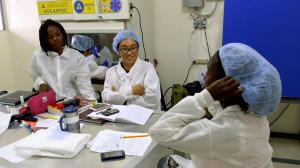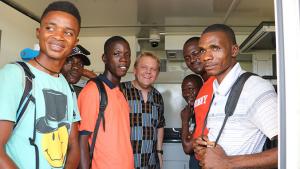UH and African country collaborate on infectious disease efforts
University of Hawaiʻi at MānoaLink to sound and video: https://bit.ly/2RTzgEb
Nine thousand miles from Hawaiʻi, on the West African coast, the University of Hawaiʻi and the University of Liberia (UL) have begun a partnership with a global aim—to improve the world’s response to a future deadly infectious disease outbreak, whatever the contagion may be, or perhaps to quell an outbreak altogether.
The Centers for Disease Control and Prevention has entered into a five-year, $2.5 million cooperative agreement grant with the two universities so that researchers in both countries may work together with the Liberian government to collect blood samples from all health districts across Liberia. The end goals are to establish a disease surveillance system and a database from which scientists hope to learn how survivors fought the deadly Ebola virus outbreak in Liberia. The results may even shed light on what other viruses may be circulating in this region of Africa.
“One thing that became obvious after the 2014–2015 outbreak was that the public health infrastructure in wide swaths of Africa, particularly in West Africa, is very weak, with very few doctors, nurses and other healthcare professionals,” said Axel Lehrer, virologist at the UH Mānoa John A. Burns School of Medicine (JABSOM) and principal investigator of the grant. “And then, unfortunately, there was a large loss of life among the medical professionals caring for the sick. This health emergency showed the danger emerging infectious diseases pose to the people there and to the global community, and how important it is to strengthen the local medical systems in order to prevent something like that from happening in the future.”
With a long record of experience in global health, including work in Africa, the Tropics and the Americas to battle Malaria, Dengue, Ebola, Zika and other disease agents, JABSOM’s Department of Tropical Medicine, Medical Microbiology and Pharmacology is well positioned to assist in the rebuilding of Liberia’s research and healthcare workforce.
“I'm really proud to say that our faculty have experience working in these countries,” said Vivek Nerurkar, chair of tropical medicine, medical microbiology and pharmacology at JABSOM. “We are hoping that in the next five to 10 years, Liberia will have its own staff and personnel who can man their hospitals as well as the teaching facilities.” Viral immunologist Wei-Kung Wang and epidemiologist Alan R. Katz are also part of the UH Mānoa team.
In January 2019, the UH research team and its collaborators delivered several state-of-the-art mobile medical labs to Liberia, where officials from the UL and the Liberian government held a ceremony to celebrate the scientific and healthcare collaboration. Also in attendance were representatives of Baylor College of Medicine, which designed and built these $1.5-million laboratories with funding from the Paul Allen Family Foundation and donated them to UL and the National Public Health Institute of Liberia.
Lehrer and his team know the task ahead will take years. But the rewards that may lie ahead hold promise for decades to come.
“We will collect a very large set of samples, large enough we hope that other researchers can also then draw upon them if they want to continue someday from where we leave off. And therefore, it will really put the University of Hawaiʻi in a position to help future generations, to be connected forever with this groundbreaking research that is going on in Africa,” said Lehrer.
Both Lehrer and Nerurkar are confident that the research and training of Liberian students will go smoothly due to a pilot project conducted in 2018. UH undergraduate and graduate students were deployed to Liberia in the summer of 2018 under a National Institutes of Health funded research program already housed at the JABSOM tropical medicine department.
In the Ledlum veterinary diagnostic lab located on the UL Fendall campus (Liberia Ministry of Agriculture), UH Mānoa graduate Kianalei Machida and Kapiʻolani Community College student Melissa Takaaze worked beside UL students Abigail Dweh and Saymajukon Forkay, testing blood samples from dogs for antibodies binding to antigens from Ebola and other viruses.
The Hawaiʻi students learned quickly that their life in Liberia had its challenges—no running water for baths, drinking or even in the laboratory. And electricity was spotty. But the visiting researchers counted numerous rewards, too.
“At the surface it may not seem like this laboratory here has all of the full amenities of a Western laboratory. The work can be done, and it can be done well, and I am proud and humbled to be a part of that experience to be able to demonstrate a way that we are able to overcome these kinds of obstacles and perform great work,” said Takaaze.
Both Liberian students expressed pure joy over pipetting, measuring liquids using state-of-the art laboratory equipment. But they were equals in the laboratory. Learning, yes, but teaching too.
“It's kind of interesting that we have people teaching us, and we too we have to teach them,” said Forkay. “They don't know most of our cultural practices. We have to help them so they can interact with people and so they can understand people that live in Liberia too.”
JABSOM PhD student Brien Haun led the work with the students in Liberia and is the lead author of a publication in PLoS Neglected Tropical Diseases (July 2019) describing the experience. The Liberia pilot project coordinator, John Berestecky, returned with enthusiastic reviews about the summer’s experience.
“We’re hoping that this project has in fact demonstrated that we can work in Liberia—a very difficult place to work—and we can put together a project that is successful,” said Berestecky, a microbiology professor at Kapiʻolani CC.
“I think the whole workforce development starts right there that not only you teach in a classroom setting, but you also have teaching going on in the laboratory setting so that the people can finish their degrees and get a job out there,” added Nerurkar.
The training of new laboratory and healthcare workers in Liberia will also provide continued cultural exchanges that foster new learning for U.S. and international researchers training at UH.
Link to sound and video: https://bit.ly/2RTzgEb
BROLL: (1 minute, 20 seconds)
0:00-1:08, 15 clips: UH students working with University of Liberia students
1:08-1:20, 3 photos: group shots with John A. Burns School of Medicine researchers
SOUND:
Vivek Nerurkar, JABSOM Tropical Medicine Chair
“We are hoping that in the next five or 10 years, Liberia will have its own staff and personnel who can man their hospitals as well as the teaching facilities.” (13 seconds)
Axel Lehrer, JABSOM virologist and principal investigator
“We will collect a large, hopefully a very large, set of samples that other researchers can also then draw upon if they want to continue from where we left off. And therefore, I mean, it will really put the University of Hawaii on a global reach here where, you know, we will be connected with what this groundbreaking research that is going on in Africa.” (30 seconds)


